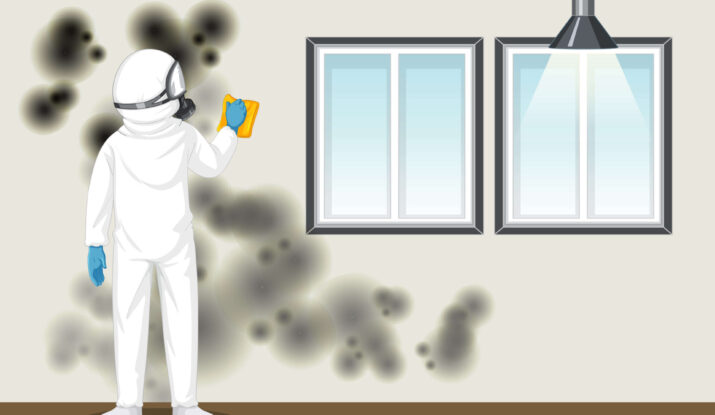Have you ever thought about those unseen visitors in your indoor air? The answer might be mold spores – tiny particles affecting your health and air. You’re not alone if you want to know more about the air you share with these tiny companions.
Checking indoor air for mold spores is a smart move to make your living space healthier.
In a few sentences, we’ll look at simple ways to determine if mold spores are around, giving you the information you need for fresher air at home.
Importance of Indoor Air Quality
The air quality inside buildings is crucial for the well-being of people in homes, offices, and other places. It affects health, comfort, and how well we can get things done.
Let’s look at why having good indoor air quality matters in different aspects:
- Health and Well-Being:
Respiratory Health: Poor indoor air can lead to breathing problems like asthma and allergies. Things like mold, dust, and pet particles in the air can make these issues worse.
Reducing Allergens: Keeping the air clean by cleaning regularly, having good ventilation, and using air filters helps people with allergies feel better. - Productivity and Cognitive Performance:
Cognitive Function: Clean air is linked to better thinking and completing work. When the air is fresh, and there are fewer pollutants, it’s easier to focus and learn.
Employee Well-Being: Businesses benefit from good air quality, too. Employees in places with clean air are happier, more focused, and less likely to feel sick from being in a building for too long. - Comfort and Quality of Life:
Thermal Comfort: Air quality connects with how comfortable we feel with the temperature and humidity. Good ventilation and climate control systems make indoor spaces more enjoyable.
Odor Control: Smells can affect how we feel about the air. Proper ventilation and cleaning up help create a nicer and more comfortable living or working environment. - Long-Term Health:
Preventing Health Issues: Breathing in poor air for a long time can lead to serious health problems. Keeping the air clean is a way to stop these problems from happening.
Vulnerable Populations: Some people, like kids, older adults, or those with health issues, are more affected by poor air. It’s crucial to make sure the air is healthy for these groups. - Regulatory Compliance and Property Value:
Regulatory Standards: Many places have rules about air quality in public places and homes. Following these rules is not just about health; it also helps avoid legal problems.
Property Value: Buildings with good air quality are more appealing to buyers or renters, making the property more valuable.
Potential Health hazards associated with Mold Spores
Mold spores, tiny particles floating in the air, may seem harmless, but they can bring hidden dangers to indoor and outdoor spaces. Knowing these risks is important for keeping living or working areas healthy.

Let’s explore the various aspects of mold spores and how they can affect human health, buildings, and the environment.
- Health Risks
Mold spores can cause respiratory issues, allergies, and produce harmful mycotoxins. Inhalation of these particles can irritate the respiratory tract, leading to coughing, sneezing, and breathing difficulties. Allergic reactions may include skin rashes, watery eyes, and nasal congestion. It is crucial to address mold issues promptly and identify the type of mold present to assess associated health risks. - Structural Damage
Mold weakens building materials and can risk structural integrity. It can reduce property value, making it hard to sell or lease. - Environmental Impact
Mold is natural and helps break down organic matter. But too much mold harms the ecosystem balance, affecting plants, animals, and microorganisms. Mold indoors worsens air quality, leading to respiratory issues for people around. It’s crucial to control mold growth for a healthy environment and good air quality.
Why Test for Mold Spores?
Testing for mold spores is crucial due to the increasing awareness of their hidden dangers. Mold testing is vital in recognizing, dealing with, and lessening potential risks linked to mold infestations.
In this section, we explore why mold spore testing is essential in homes and businesses.
1. Early Detection
Preventing Health Issues: Mold-related health problems often occur with prolonged exposure. Early detection through regular mold testing helps identify mold spores before they reach harmful levels, reducing the risk of respiratory issues, allergies, and other health complications.
Proactive Maintenance: Mold thrives in damp conditions. Proactive testing allows property owners to identify potential problem areas before mold becomes widespread. Early detection enables targeted maintenance and moisture control, minimizing the risk of structural damage.
2. Establishing Baseline Air Quality
Indoor Air Quality Assessment: Mold spores significantly impact indoor air quality. Mold testing establishes a baseline by measuring the concentration of mold spores, which is crucial for comparing future results and assessing the effectiveness of remediation efforts.
Identifying Hidden Mold: Some mold infestations are not visible. Testing helps identify hidden mold in inaccessible areas, ensuring all sources of contamination are addressed and preventing recurring issues.
3. Confirmation of Mold Types
Differentiating Harmless and Harmful Molds: Mold testing distinguishes harmless molds from those producing mycotoxins or allergens. Knowing the specific types of mold allows for targeted remediation strategies and a more accurate assessment of potential health risks.
Understanding Mycotoxin Risk: Testing for mycotoxins, toxic byproducts of certain molds, provides valuable information about potential health risks. This understanding is crucial for developing effective remediation plans and ensuring occupant safety.
4. Regulatory Compliance
Meeting Health and Safety Standards: Some places have regulations about indoor air quality and mold prevention. Mold testing helps property owners comply with these standards, reducing the risk of legal and financial consequences.
Due Diligence for Real Estate Transactions: In real estate transactions, mold testing is vital for due diligence. Detecting and addressing mold issues before finalizing a transaction can prevent disputes, protect property values, and ensure a smooth process.
What to do if Mold Spores are Detected?
Discovering mold spores is a crucial initial step, and the actions taken afterward are vital in managing and reducing the risks associated with mold infestations.
Here, we explore the recommended steps and best practices if mold spores are detected in a home or business.
- Consultation with Professionals
When you detect mold spores, involve certified inspectors for a thorough assessment and effective remediation plan. For complex cases or potential toxins, consult environmental health professionals to understand health risks and develop appropriate remediation strategies. - Remediation Planning
To effectively address mold issues, develop a comprehensive remediation plan that outlines the scope of work, identifies moisture sources, and details tailored removal and prevention steps. Moisture control is key, so address the source of moisture to prevent mold growth by ensuring proper ventilation and dehumidification. - Professional Remediation Services
Hire Qualified Mold Remediation Specialists for extensive infestations or cases involving toxins. Professionals follow industry-standard practices to protect occupants and property. Adhere to EPA or IICRC guidelines for safe and effective remediation. - Preventive Measures
To prevent future mold growth, monitor regularly, address water issues right away, and ensure proper ventilation, insulation, and moisture control. Educate occupants on mold prevention and maintenance practices, such as prompt reporting of leaks and regular cleaning. - Continuous Monitoring
Regular mold inspections are recommended to ensure effective remediation and catch issues early. Periodic air quality testing ensures healthy indoor environments, especially where mold-related health issues may occur.
Frequently Asked Questions
What are common signs that indicate the presence of mold in a property?
Signs of mold include visible growth, musty odors, water stains, and health symptoms. Regular inspections and prompt attention to water damage can help detect mold early.
Can I remove mold, or do I need professional help?
Mold infestations can be managed with DIY methods if minor. Recurring or extensive mold issues, especially those involving mycotoxins, are best handled by certified mold remediation specialists for safe and thorough removal.
How does mold impact indoor air quality?
Mold can harm indoor air quality by releasing spores and mycotoxins. Regular air quality testing and mold inspections are crucial for a healthy environment.
What preventive measures can be taken to avoid mold growth?
Prevent mold by ventilating, dehumidifying, fixing leaks, insulating, maintaining, and educating.
Are all types of mold harmful to health?
Some molds are harmless, while others produce toxins and allergens that pose health risks. Identifying the specific type of mold through testing allows for accurate assessment of health risks and targeted remediation.
Conclusion
As we wrap up our exploration of testing indoor air quality for mold spores, we’ve provided you with the information and resources to cultivate a healthier and safer living space. Regular testing and proactive measures guarantee that you and your loved ones can enjoy clean and fresh air.
A home without mold is a healthy home, and by embracing the insights shared in this guide, you’re taking a significant step toward achieving just that.
Here’s to the fresh, clean air that awaits you!

